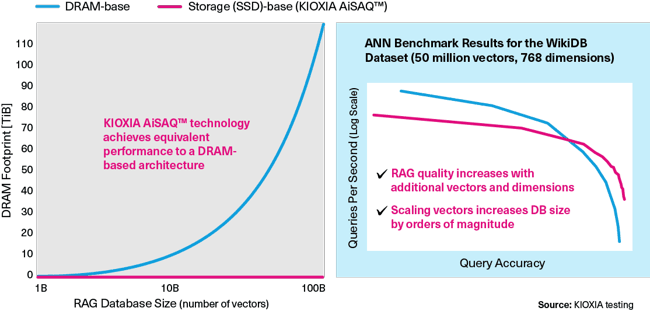Updated Kioxia AiSAQ Software Advances AI RAG with New Version of Vector Search Library
Introduces flexible controls allowing system architects to define balance point between search performance and number of vectors, which are opposing factors in fixed capacity of SSD storage in system
This is a Press Release edited by StorageNewsletter.com on July 4, 2025 at 2:01 pmIn an ongoing effort to improve the usability of AI vector database searches within retrieval-augmented generation (RAG) systems by optimizing the use of SSDs, Kioxia Corporation announced an update to its AiSAQ (All-in-Storage ANNS with Product Quantization) software.
This new open-source release introduces flexible controls allowing system architects to define the balance point between search performance and the number of vectors, which are opposing factors in the fixed capacity of SSD storage in the system. The resulting benefit enables architects of RAG systems to fine tune the optimal balance of specific workloads and their requirements, without any hardware modifications.
First introduced in January 2025, AiSAQ software uses a novel approximate nearest neighbor search (ANNS) algorithm that is optimized for SSDs and eliminates the need to store index data in DRAM. By enabling vector searches directly on SSDs and reducing host memory requirements, AiSAQ technology allows vector databases to scale, largely without the restrictions caused by limited DRAM capacity.
When the installed capacity of the SSD in the system is fixed, increasing search performance (queries/second) requires more SSD capacity consumed per vector. This results in a smaller number of vectors. Conversely, to maximize the number of vectors, SSD capacity consumption per vector needs to be reduced, which results in lower performance. The optimal balance between these 2 opposing conditions varies depending on the specific workload. To find the appropriate balance, AiSAQ software introduces flexible configuration options. This latest update allows administrators to select the optimal balance for a variety of contrasting workloads among the RAG system. This update makes AiSAQ technology a suitable SSD-based ANNS for not only RAG applications but also other vector-hungry applications such as offline semantic searches.
With growing demand for scalable AI services, SSDs offer a practical alternative to DRAM for managing the high throughput and low latency that RAG systems require. AiSAQ software makes it possible to meet these demands efficiently, enabling large-scale generative AI without being constrained by limited memory resources.
By releasing AiSAQ software as open-source, Kioxia reinforces its commitment to the AI community with the promotion of SSD-centric architectures for scalable AI.
Resource:
Link to download Kioxia AiSAQ open-source software
Technical Brief Introducing KIOXIA AiSAQ Technology for AI










 Subscribe to our free daily newsletter
Subscribe to our free daily newsletter

